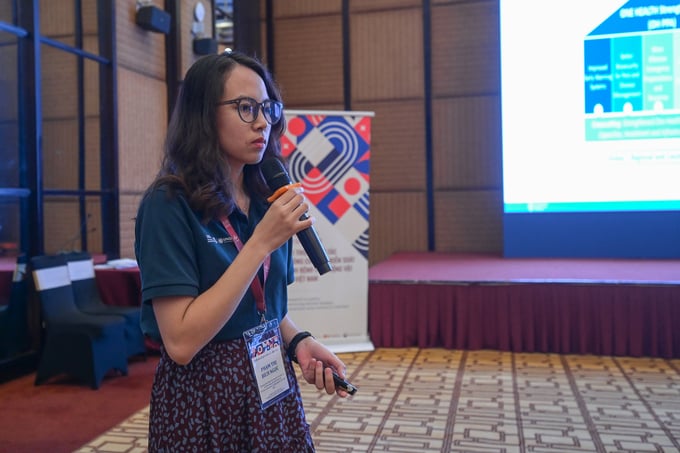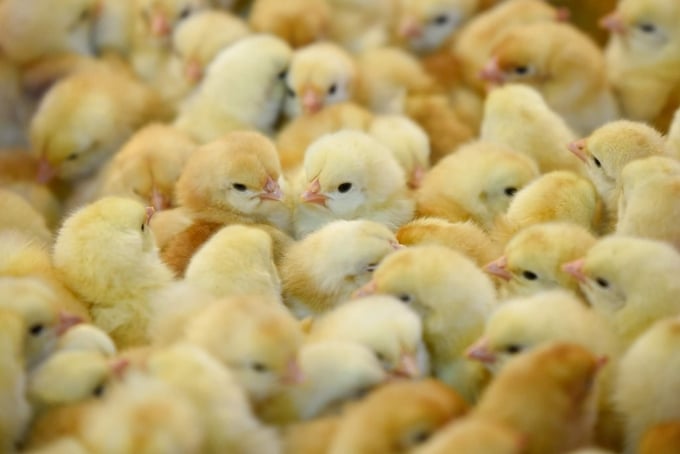January 2, 2026 | 05:14 GMT +7
January 2, 2026 | 05:14 GMT +7
Hotline: 0913.378.918
January 2, 2026 | 05:14 GMT +7
Hotline: 0913.378.918

Representative from FAO, Ms. Pham Thi Bich Ngoc presented on the animal health early warning system. Photo: Tung Dinh.
As part of the ongoing workshop titled “From research to policy: Improving animal disease prevention and control in Vietnam," the representative from FAO in Vietnam gave a presentation on the Animal Disease Early Warning System on the morning of October 18.
FAO's mission to tackle hunger, food insecurity, and malnutrition in all its forms led to the establishment of the Emergency Centre for Transboundary Animal Diseases (ECTAD). The center aims to provide early warnings of animal health emergencies.
According to Ms. Pham Thi Bich Ngoc, ECTAD's primary objective is to reduce pandemic risks while also protecting livelihoods, productivity, income, nutrition, and health. It emphasizes strengthening the capacities of all countries, especially developing ones, to deliver early warnings, mitigate risks, and manage national and global health threats effectively.
In parallel, the initiative seeks to build resilience among the poor and vulnerable, reducing their exposure to climate-related extreme events and other economic, social, and environmental shocks.
To achieve these goals, FAO collaborates with countries to enhance their abilities to prevent, detect, respond to, and recover from major animal diseases, zoonoses, and other animal-origin threats. This capability enables early warnings, early detection, and more effective responses.
“Protecting livestock from diseases and preventing their spread is key to combating hunger, malnutrition, and poverty,” emphasized Ms. Pham Thi Bich Ngoc.
FAO’s disease surveillance process follows a structured approach: Detection, Verification, Analysis, Risk Assessment and Forecasting, and Publication. Additionally, FAO supports early detection through activities such as: Surveillance for early detection; Communication and information provision; Understanding and monitoring risks; Supporting decision-making during intervention.
Ms. Ngoc elaborated that the early warning system will help reduce the incidence of diseases in humans, livestock, and wildlife, prevent the emergence or incursion of new diseases, and preserve the effectiveness of antimicrobial agents.

Monitoring and early warning are crucial to reduce the risk of pandemics in livestock farming. Photo: Tung Dinh.
To support early warning activities, the Vietnam Animal Health Information System (VAHIS) of the Department of Animal Health (Ministry of Agriculture and Rural Development) was established. The Department of Animal Health developed VAHIS with technical support from FAO and financial support from USAID and was launched on August 28, 2018.
Since September 1, 2018, VAHIS has been in use nationwide, following the issuance of Official Letter 6785/BNN-TY on August 30, 2018. The platform offers several advantages: it is accessible online, allows real-time reporting, stores data on a single system, and operates with low costs.
At the central level, the Department of Animal Health manages disease information reported from 63 provinces and cities. It compiles and synthesizes these reports to inform leaders at the Department of Animal Health, MARD, and international organizations.
At the provincial level, specialized agencies report on terrestrial animal diseases, monitor outbreaks across districts, and ensure that outbreaks are tracked and reported no later than 21 days after detection.
Since 2022, the Department of Animal Health has continued to collaborate with FAO to enhance VAHIS by developing the Aquatic Animal Disease Reporting Component. Training sessions and pilot programs have been organized for veterinary management agencies across 63 provinces and cities to facilitate the system’s use for reporting aquatic animal diseases.
VAHIS has so far proven effective in meeting the requirements for managing animal disease information. It aligns with national policies on the adoption of information and digital technologies, offering comprehensive data integration and epidemiological analysis. This capability ensures timely support for decision-making and effective disease prevention efforts at both central and local levels.
Thanks to the system’s operational success, VAHIS has integrated historical animal disease data (active surveillance) into its platform. Moving forward, the system will be upgraded with additional components, including a mechanism for animal disease reporting from the district level.
The FAO Emergency Centre for Transboundary Animal Diseases (ECTAD) Viet Nam program was established early in 2006 to support the Viet Nam government in combatting the spread and entrenchment of highly pathogenic avian influenza (HPAI H5N1).
FAO ECTAD VietNam receives financial supports from various organizations such as the United States Agency of International Development (USAID), Australian Department of Foreign Affairs and Trade (DFAT), Republic of Korea (ROK), United States Defense Threat Reduction Agency (DTRA), The European Commission (EC), The United Kingdom (UK) Fleming Fund and UN joint funds. With these supports, FAO ECTAD partners with the government of Viet Nam to reduce pandemic risk while preserving health, nutrition, livelihood, and productivity.

(VAN) Located in three former provinces, Nam Dinh, Thai Binh, and Ninh Binh, and now in two provinces, Ninh Binh and Hung Yen, "Red River Delta" is the name of Vietnam's first interprovincial coastal wetland World Biosphere Reserve.
/2025/12/29/1046-1-210728_624.jpg)
(VAN) In 2025, Viet Nam recorded severe and extreme disasters, breaking multiple historical records and causing heavy losses in lives, property, and infrastructure nationwide.

(VAN) Applied technologies, water-saving irrigation is a strategic solution to promote climate-resilient agriculture and strengthen water security in the uplands.
/2025/12/29/3936-3-163422_251.jpg)
(VAN) Can Gio mangrove forest in particular and the entire Can Gio Mangrove Biosphere Reserve in general hold great potential for carbon credits.

(VAN) Chu Pah Rubber has announced its products that comply with the EU Deforestation Regulation (EUDR), affirming its commitment to sustainable production and product origin transparency.

(VAN) Deputy Director Nguyen Hoai Nam stated that a digital data platform will be developed with agricultural sector databases, utilizing AI to help farmers make informed decisions on 'watering correctly, sufficiently, and efficiently.’
/2025/12/29/4841-2-134224_777.jpg)
(VAN) From only about 10 individuals in 2009, the wild elephant population in Dong Nai has recovered to nearly 30 animals after more than 10 years.